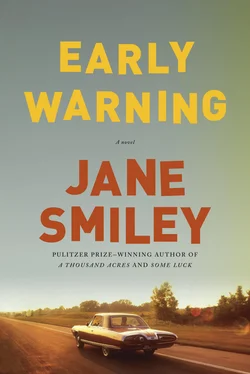Jane Smiley - Early Warning
Здесь есть возможность читать онлайн «Jane Smiley - Early Warning» весь текст электронной книги совершенно бесплатно (целиком полную версию без сокращений). В некоторых случаях можно слушать аудио, скачать через торрент в формате fb2 и присутствует краткое содержание. Год выпуска: 2015, Издательство: Knopf, Жанр: Современная проза, на английском языке. Описание произведения, (предисловие) а так же отзывы посетителей доступны на портале библиотеки ЛибКат.
- Название:Early Warning
- Автор:
- Издательство:Knopf
- Жанр:
- Год:2015
- ISBN:нет данных
- Рейтинг книги:5 / 5. Голосов: 1
-
Избранное:Добавить в избранное
- Отзывы:
-
Ваша оценка:
- 100
- 1
- 2
- 3
- 4
- 5
Early Warning: краткое содержание, описание и аннотация
Предлагаем к чтению аннотацию, описание, краткое содержание или предисловие (зависит от того, что написал сам автор книги «Early Warning»). Если вы не нашли необходимую информацию о книге — напишите в комментариях, мы постараемся отыскать её.
, a national best seller published to rave reviews from coast to coast.
Early Warning — читать онлайн бесплатно полную книгу (весь текст) целиком
Ниже представлен текст книги, разбитый по страницам. Система сохранения места последней прочитанной страницы, позволяет с удобством читать онлайн бесплатно книгу «Early Warning», без необходимости каждый раз заново искать на чём Вы остановились. Поставьте закладку, и сможете в любой момент перейти на страницу, на которой закончили чтение.
Интервал:
Закладка:
After another meal, Tim marched everyone to more classes — army rules, army chain of command, commo etiquette—“You heard ‘over and out.’ Well, this ain’t Hollywood, this is the real thing. ‘Over’ means ‘now you talk,’ and ‘out’ means ‘goodbye,’ and ‘over and out’ means dogshit!” Another thing that he learned early on was “Diddy dum dum diddy”: “Repeat what you just said.”
—
AFTER FORT GORDON (teletype), Tim got two weeks’ leave before deployment. He spent a week at home, but he couldn’t settle down to eat or to talk or to look at his father. He was so restless that he couldn’t wait at the airport for a plane to San Francisco, where he planned to stay with Aunt Eloise for a few days. He took the plane to Los Angeles, squirming in his seat the whole way. When he got off the plane, he decided that he couldn’t take a bus, or even another plane, up the coast. He had to hitchhike, and the most direct route looked to be the 101.
Texas and Arizona had not prepared him for California. The sunshine was brilliant but refreshing, and even when the ocean was invisible, Tim could sense that it was out there — not the flat, warm, green-blue ocean he knew from Maryland and New Jersey, but something colder, more beautiful, and more endless, lit by the sun to a burnished hyacinth color hour after hour for the whole long day. And hitchhiking was easy, especially in uniform. The first car took him to Venice; that guy offered him a hamburger. The second couple, about his parents’ age, took him to Morro Bay, where they invited him to stay the night. The next one to stop was a girl, maybe seventeen, who seemed unafraid, and took him up and down a steep grade — maybe the steepest he’d ever seen — to Atascadero. A Mexican fellow got him to Salinas, and another guy dropped him near the San Jose airport. The weather was perfect, and the hills to either side of the road were pale velvety green. At San Jose, he made his way to a different highway, one that headed to Oakland, and he waited. It was almost dusk when a pickup truck — a beat-up Ford — stopped maybe a hundred feet past him, and an arm waved to him out of the passenger’s window. He shouldered his duffel bag and ran.
A guy in a sharkskin suit opened the door and got out, throwing a large package into the bed of the truck, and gesturing to Tim to throw his duffel in there. A woman was driving, maybe Tim’s age. She had on a revealing beige cotton dress and high-heeled sandals. Both the man and the woman wore sunglasses, even though the sun was about down. He got between them, and at once began to regret it. “You in the army?” said the guy, as if that wasn’t obvious, but before Tim could speak, he said, “I was a marine myself. Out of Camp Pendleton. You know where that is? Down south. We’re coming from around there now.” He looked Tim up and down, then said, “We should feed this guy to the horses.” The girl laughed. “I was in the marines for eight years. You believe that?” Tim opened his mouth, and the girl laughed and said, “No!”
“Eight fucking years,” said the guy. “Thought I was a big shot. Who did Wayne get?”
The girl said, “A sailor.”
“Yeah.”
“He said.”
“Anyway, I’m out now. Never got to ’Nam. I don’t look that old, but I’m forty.”
“You look forty,” said the girl.
“Shut the fuck up,” said the guy.
“Well, you dress like someone’s dad.”
“I dress like your dad. That’s why you fuck me.”
Tim shifted his weight. They passed a sign that said “Fremont.” Tim looked at the speedometer — eighty-seven. The girl said, “Keep telling yourself that, asshole.”
There was a pause, and then the guy turned suddenly to Tim. “Where you headed, soldier?”
Without thinking, Tim gave Eloise’s address. The two exchanged a glance across him, and the glance clearly said, Nice neighborhood. As if to underline this thought, the guy said, “We can take you right there. No trouble.”
Tim’s skin was practically prickling, he was so sure that this man was dangerous. Here it was, 1966, and he was dressed like an old-time gangster from New Jersey: the sharkskin suit, right down to the flashy tie, and his hair had marks from being combed that you only got with plenty of Vitalis. He offered Tim a cigarette, which Tim took, and then the three of them smoked in the darkness with a thoughtful air as they sped toward Oakland.
The girl knew right where to go, as if she was from Oakland, and the girl and the man exchanged two more significant glances as they turned corners. Eloise’s neighborhood hadn’t started out nice — the houses were modest wooden ones, similar to one another and probably built from kits. But the yards were large, the trees and gardens had grown up nicely, and now it was a little on the prestigious side, or so Eloise had told his mother. You could see under the streetlights that nice cars were parked in front of them, too: T-birds, a couple of Chryslers, an Oldsmobile, a Cadillac. When the man peered up through the windshield, let his gaze drift along the block with a whistle, Tim became convinced that he planned to kill Tim, and maybe Eloise and whoever was there at the moment — his cousin Rosa, her baby. He maybe outweighed Tim by fifteen pounds, but a lot of that was belly. If he had to, Tim could take him.
The man read out the addresses in the dark, and the girl pulled up in front of Eloise’s place, now dimly visible, the porch light bright. The girl turned off the engine. The three of them sat there. Then the man shifted deliberately and stared at him. He said, “I like this place. I like this whole neighborhood. Why don’t you introduce me to your friends?”
After a moment, in the toughest voice he could come up with, Tim said, “Well, get out, then.” His plan was to grab his duffel bag and hit this guy behind the knees as he was heading up the walk. If the guy had a gun, and made Tim go in front, then Tim would stop suddenly and throw the duffel at the guy’s head. His heart started to pound. The guy opened his door and stepped onto the curb — not right under the streetlight, but well lit all the same. Tim eased out behind him. The guy’s hand slipped into his pocket, and Tim stepped backward, his hand on the rim of the truck bed, until he was out of the light. He reached for his duffel and pulled it toward him, then moved around the corner of the truck bed. He bent his knees and straightened them, bent them again, poised to spring. The man banged suddenly on the hood of the truck with both hands, and Tim jumped. The man laughed derisively. He jerked himself back into the cab of the truck and shouted, “Just putting you on, kid!” The girl sped away, leaving Tim standing in the street with his duffel in his arms. He trembled for two solid minutes, maybe from fear and maybe from readiness. Afterward, he remembered it as the first time he had ever been afraid for his life.
—
FOR SOME REASON, Tim thought there would be fighting as soon as the plane landed in Vietnam. It would be like that movie he’d seen years ago, Pork Chop Hill —lines of armed men in helmets, crawling from one ditch to another, only straightening up for half a second to fire their weapons at the unseen enemy. But the first thing he saw was air-force guys with their shirts off, walking around in the sunshine. The first thing he smelled, since it was morning, was shit disposal, a powerful combination of what was in the latrines and the diesel fuel they lit to burn it. The air was hot and humid, like Virginia on the worst day of the summer, but the light was bright and oceanic. There was sand everywhere. He realized he had landed at a tropical beach. The second thing he smelled was something sharp, yet floral: incense. That was the smell that told him he was far from home.
Читать дальшеИнтервал:
Закладка:
Похожие книги на «Early Warning»
Представляем Вашему вниманию похожие книги на «Early Warning» списком для выбора. Мы отобрали схожую по названию и смыслу литературу в надежде предоставить читателям больше вариантов отыскать новые, интересные, ещё непрочитанные произведения.
Обсуждение, отзывы о книге «Early Warning» и просто собственные мнения читателей. Оставьте ваши комментарии, напишите, что Вы думаете о произведении, его смысле или главных героях. Укажите что конкретно понравилось, а что нет, и почему Вы так считаете.











